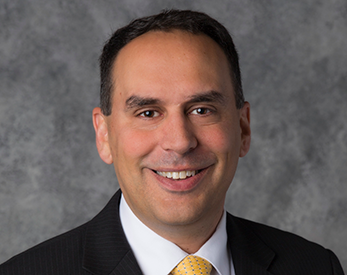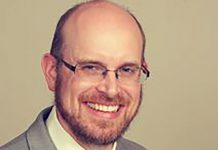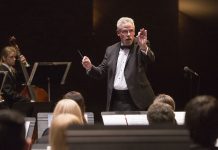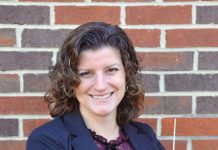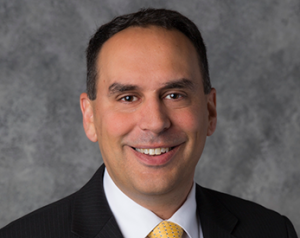 Year of Graduation – 2004
Year of Graduation – 2004
Current Position – Director of Athletic Bands, South Dakota State University
Time in current position – I just completed my first year.
What was your background before ABC?
I earned my Bachelor of Music Education degree from South Dakota State University in 1998. taught 5-12 band at the Brandon Valley Schools from 1998-2012. I taught a little of everything- 5th-grade band, 7th-grade band, 8th-grade band, high school jazz band, concert band, and eventually the top Symphonic Band. I was director of the Marching Lynx from 2003-2011.
My ABC experience came in the midst of that part of my career. (2002-04)
Name some other accomplishments or awards since graduation.
I’m very proud of the program that I was a part of at Brandon Valley. I started as an assistant in an established, highly-respected program. I eventually became the Director of Bands and would like to think that I helped to continue the tradition of excellence. In 2012 I was awarded a Graduate Teaching Assistantship at the University of Iowa. I spent three years there under the tutelage of Director of Bands Mark Heidel, who is an incredible musician, conductor, and human being. I also served as an assistant for the Hawkeye Marching Band, directed by the wonderful Mr. Kevin Kastens. I also directed the Pep Band. During that time I had the opportunity to direct the Iowa Symphony Band and write arrangements and drill for the marching band. It was a very exciting experience – I got to conduct the Pep Band in Madison Square Garden, and my drill and arrangements were used by the marching band at the 2015 Taxslayer Bowl. One of the things I’m most proud of is having the opportunity to play euphonium on the premiere of “Only Light” by Aaron Perrine with the Iowa Symphony Band at the CBDNA North Central Regional in 2014. The piece would go on to win the Ostwald Award. It’s an absolutely gorgeous work that I’m proud to be associated with in that way.
How did ABC help prepare you for these?
There are so many things about ABC that helped grow as a teacher. Every element was important – the leadership seminars, the conducting experiences, the sense of family and collaboration. However, there were two elements that were especially important. The first was the opportunity to work with musicians who are the very best at what they do. It opened my eyes how carefully I needed to hone my rehearsal technique. They were supremely prepared, had a tremendous “aural image” of what they wanted from an ensemble before they stepped on the podium, and knew just what to say to make that image a reality. The other was how much better I became at understanding and teaching instruments other than my own. This was due to the gifted pedagogues that ABC introduced us to every year. This also strengthened my score study skills (more on that later).
What was your most memorable ABC experience?
Just one? Hmmm….besides choir practice at Omar’s? (some of my 2002-04 friends will understand that.) We played under so many terrific conductor/composers – Francis MacBeth, Robert W. Smith, Johan de Meij, etc. But for me, I think the experience of playing in a band conducted by Colonel John Bourgeois was my most memorable.
Who are your biggest influences/mentors?
My high school band director, Dale Nelson, is the reason I am a band director. He was a tremendous teacher, but more importantly, he knew how to reach kids and get more out of them than even they thought they could do. John Colson, my college trumpet and conducting teacher, and James McKinney, my college director of bands, were amazing musicians and great mentors. Mr. Colson has written a couple of books on rehearsal technique that are marvelous resources. Mr. McKinney could do it all – he is the rare soul that seemed equally at home in front of a concert band, a marching band, or a jazz band. I am so blessed that I have the opportunity to stay in touch with all three of these gentlemen to this day.
What advice do you have for young directors?
Become an outstanding pedagogue. Learn the ins and outs of every instrument. Seek out lessons or do some self-teaching on instruments that you are not comfortable with. Your ensemble will not sound good until its individuals can play with a quality, characteristic sound. Teach from the podium. Learn ways to quickly improve embouchure, deal with pitch tendencies, etc during the course of rehearsal.
The better you are as a pedagogue, the better your score study will become. You’ll be able to look at a score and quickly anticipate difficulties for each instrument. Maybe the trumpet part hangs around the fifth partial, or the clarinet part keeps jumping above and below the break, or the flutes have a technical part that could be facilitated with a trill fingering.
As you become more familiar with the instruments, these types of things will jump off the page of the score. As you become better at diagnosing and fixing these technical issues, your ensemble will be technically stronger, thus making it easier to draw musicality and emotion from a performance. That’s when the real fun begins!
Where do you see yourself in 10-20 years?
South Dakota State University is home. I met my wife here and we both have degrees from here. Our families both live relatively close to Brookings. We are breaking ground on a new music facility this fall. It is my sincere hope that in twenty years I’ll still be singing the ABC partial song to my SDSU Conducting 1 class!

